I have a confession to make: My name is Meaghan, and I’m addicted to ordering seeds. Organic and heirloom seeds, to be exact.
This is going to be my first season growing from seed. 1. Because I finally have enough space that growing from transplants would be financially prohibitive. And 2. Because I have enough space for a good seed starting set-up in my basement. (Post to come on said set-up!)
Basically, I have enough space. If you haven’t checked out my About Me yet, my partner and I recently moved into a house with a yard, after living in apartments our whole adult lives. After a few years of container gardening, I am beyond excited for a couple of raised beds.
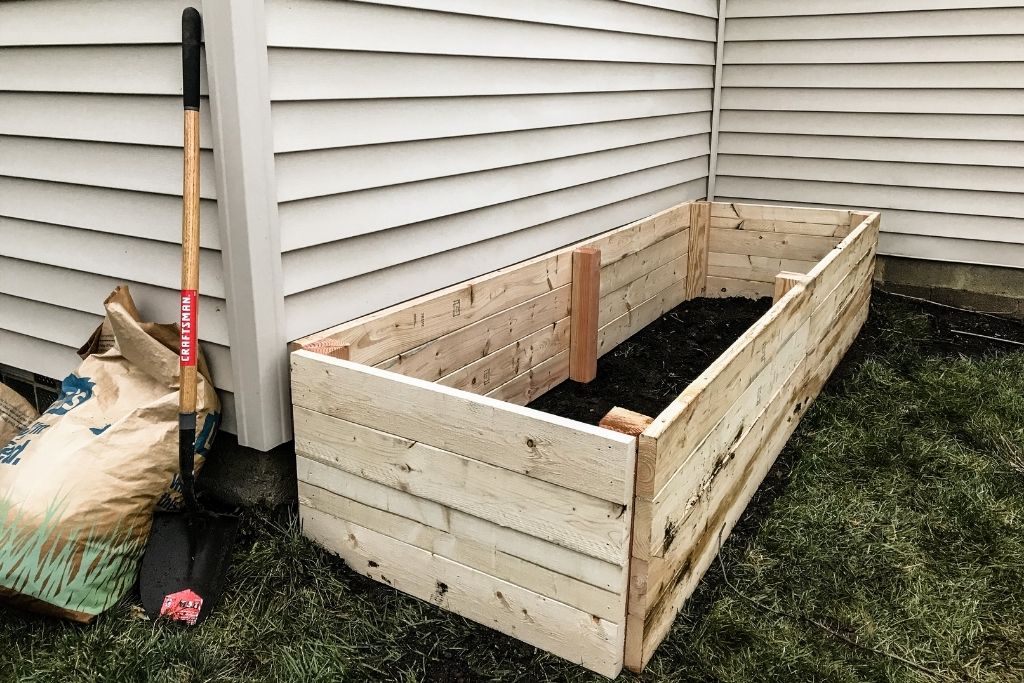
You can totally grow food anywhere, and I’m a big fan of grow bags and containers. But I’m over the moon about my raised beds.
Now, it’s only two 3×10 beds.
It’s more growing space than I’ve ever had, but we’re still only working with a 5,000 sq. ft lot and a dog that spends most of her day zooming around the yard chasing squirrels. a.k.a. her need to zoom supersedes my need to plant.
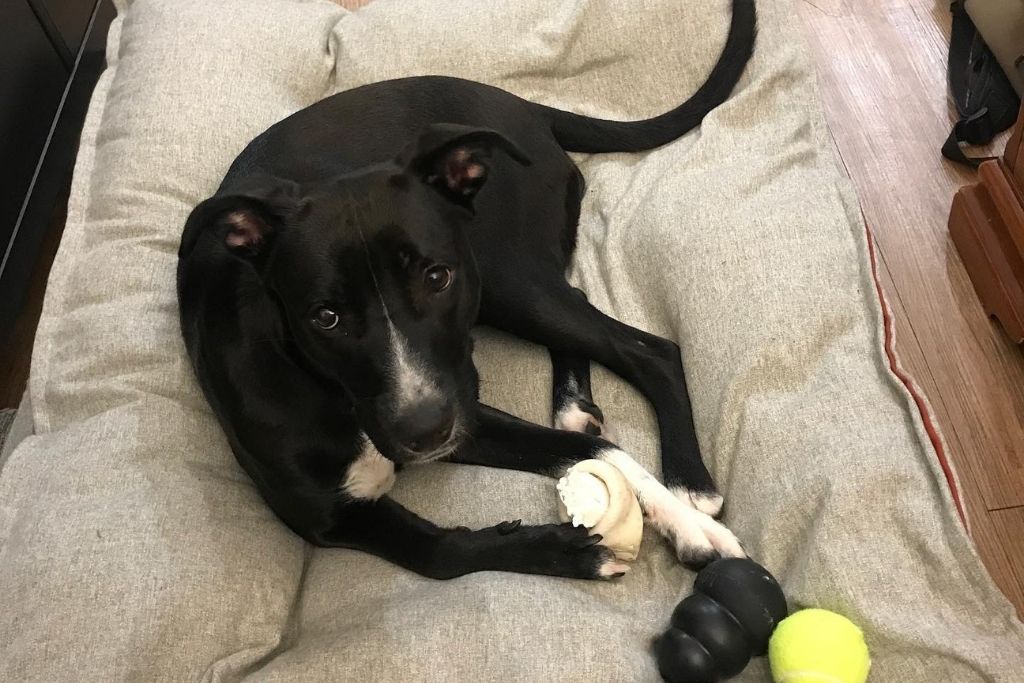
Regardless, I’ve spent many an afternoon in the last month or so perusing seed company catalogs and websites, nailing down the exact varieties I want to grow and playing around with raised bed layout to try to maximize my space.
I have posts coming up later on with my seed haul, once it’s all come in, and my plan so far. But I wanted to get this seed ordering info out there as I’ve heard from many sources that seed companies are expecting the same sort of crunch we saw last spring again. I guess one upside to the pandemic is how many new gardeners it’s produced?
But it means that if you’re like me and you’re excited to grow specific varieties of veggies, you need to get a headstart on this garden season. Plus, the dreaming and planning will help sustain you through the cold months ahead.
In fact, beyond just seeds, I’m trying to get all my gardening equipment and needs squared away ASAP – partially because I’m so excited to get started and partially so I don’t wind up in a bind if I wait too long and the thing I need is no longer in stock.
If you’re considering gardening from seed, or you’ve decided you want to but are new to the process, keep reading for some tips on how to decode seed labeling as well as suggestions for where to start shopping for organic and heirloom seeds!
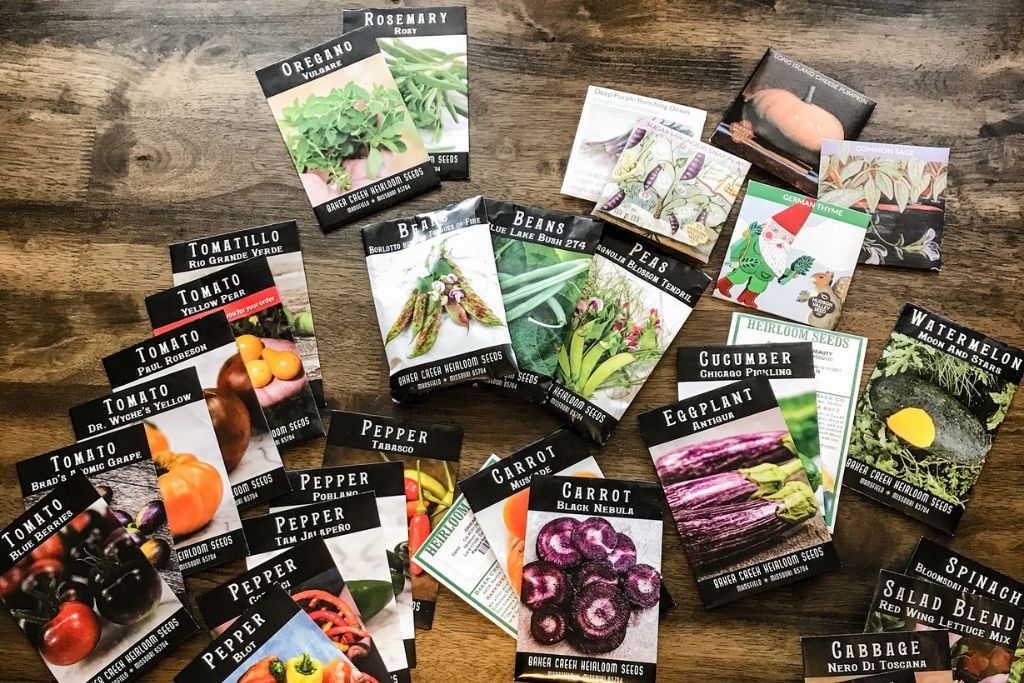
Organic and Heirloom Seed Buying Lexicon
If you’re new to gardening from seed, it can be overwhelming to sift through all the terminology and shorthand used by seed companies who do the bulk of their business with established farmers and market gardeners. We’ll talk about how to interpret a seed packet as far as growing instructions a little later on, when it’s seed starting time. But for now, I’ve put together a little cheat sheet for how you’re likely to see seeds advertised to make it easy to align your purchases with your values + garden goals.
Organic:
Seeds that have been grown and processed according to the USDA’s organic standards. Organic seeds should carry the little “USDA Organic” stamp on them as certification. Produces grow organic seeds without the use of synthetic pesticides or fertilizers.
Open-Pollinated:
Seeds produced via natural pollination (i.e. bees), without help from humans. These seeds will be true to type. So if you save seeds from a plant that grew from an open-pollinated seed, those seeds will produce the same plants year after year.
Heirloom:
Heirloom seeds are open-pollinated seeds that have been saved and passed down across many years – sometimes hundreds of years! All heirloom seeds are open-pollinated, though not all open-pollinated seeds are heirloom. Many will become heirlooms with time and careful conservation. Many heirlooms also have colored histories and fun stories associated with their conservation. Like the Cherokee Purple Tomato, a popular heirloom supposedly shared with Tennessee settlers by the Cherokee in the 1800s.
If you’re used to store-bought veggies, heirloom veg might seem like it’s exploding in flavor and nutrition compared to modern hybrids. Unfortunately, breeding for the traits that make veggies store and ship well for selling in grocery stores tends to dilute their flavor and nutritional profile. An heirloom tomato picked at the height of ripeness on a hot August afternoon is in an entirely different ballpark than an under-ripe tomato that traveled thousands of miles to wind up in a grocery store in January.
Hybrid:
Seeds produced by cross-pollinating different plants of the same species. This can be done naturally, via bees and other pollinators transporting pollen from one plant to another, manually, for example by using a brush to pollinate a zucchini plant with pollen from a different strain, or it can be done in a lab via genetic modification. Hybrids in and of themselves aren’t bad, and will occur naturally each growing season. The problem comes from genetically modified hybrids that haven’t undergone sufficient safety testing. More on that below.
F1 (or first-generation) hybrid seeds can produce strong, disease-resistant, abundant crops. However, you can’t save seeds from a F1 hybrid. If you try, the next year the new plant will revert back to the traits of one of its parents.
Non-GMO:
Big seed companies, like Monsanto, produce hybrids through genetic modification. Those seeds grow GMOs, or genetically modified organisms. While hybrids happen naturally and accidentally all the time, many are also now deliberately produced in labs using techniques like gene splicing. Scientists ensure plants yield desired traits, like disease or bruising resistance, which is a boon for big ag, who’s trying to sell you food they produce as cheaply as possible. A disease-resistant plant yields more tomatoes over its lifetime and require less maintenance.
Sounds great, right? It can be, but many people are still wary of GMOs. The problem is many haven’t undergone sufficient long-term safety testing. We just don’t know the long-term effects of consuming GMOs.
The big thing to know about GMOs for your garden, though, is that it’s illegal to sell GMO seeds to home gardeners.
Many seed companies will advertise that they only sell non-GMO seeds to help their credibility and greenwashing, but it’s a marketing gimmick.
If you want to try a hybrid variety and you’re not buying from Monsanto, you’re probably fine.
One caveat is seeds you may buy from big box stores. They won’t be GMOs, but they may come from big companies like Monsanto who also produce GMOs. Basically, think about where your money is going and what kind of food future you want to support.
Personally, I try to go for organic, heirloom and open-pollinated seed varieties. Again, not because hybrids are inherently bad, but because I find heirloom plants so interesting and beautiful. I can buy hybrids at the grocery store more cheaply than I can grow them. Cause, ya know, our food system is broken. So if I’m going to be toiling and gardening in the hot August sun, I want it to be for veggies I can’t otherwise get. One of the fun things about gardening is getting to experience food you otherwise would never get to – like sun-ripened heirloom tomatoes.
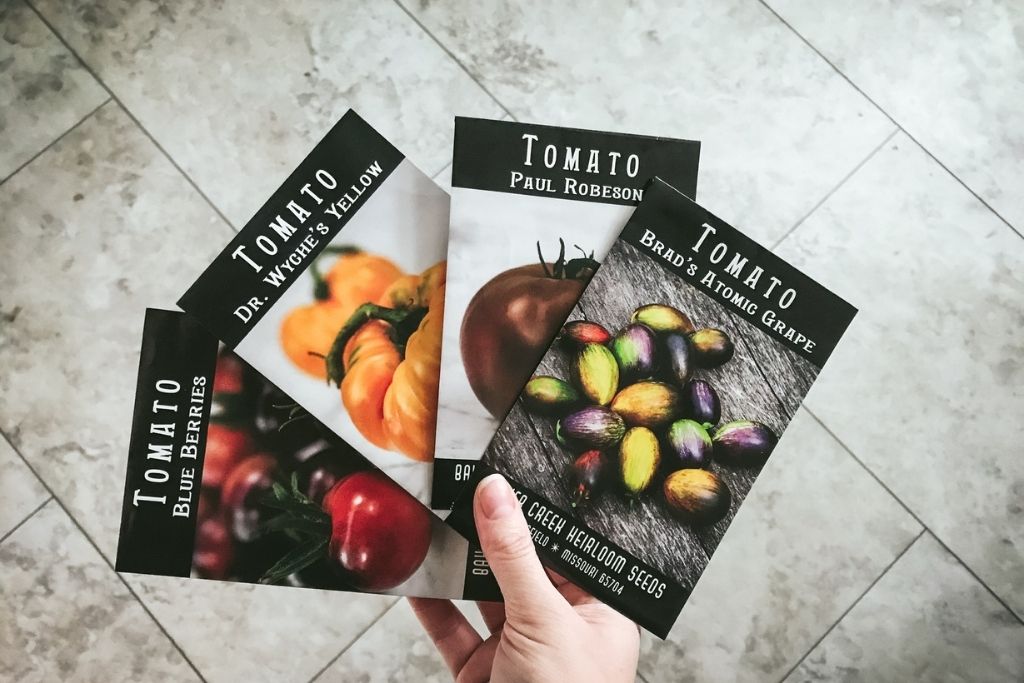
13 Places to Order Organic and Heirloom Seeds:
(Note that most of these places have free catalogs you can request on their websites!)
Baker Creek Heirloom Seeds
If you’ve been interested in heirloom gardening long, you’ve definitely heard of/ordered from Baker Creek. Based in MO, they sell only heirloom and open-pollinated hybrids, and specialize in unique varieties. Their free seed catalog comes full of info and stories about the seeds’ sources.
I also love Baker Creek’s website. People submit reviews of their experiences with various seeds, and rate them based on ease of germination, time to maturity, abundance, etc. When selecting between varieties, I peruse the reviews for people in my hardiness zone (6A) to get a better idea of which I should go for and which I would be safer avoiding.
Fruition Seeds
Fruition specializes in seeds for Northern growers. They cultivate over 300 varieties of certified organic vegetables, herbs and flowers. They select for early maturity, productivity, and disease resistance to suit the short growing seasons of the Northeast, where they’re headquartered. I also love that they guarantee over 90% germination for their seeds – whereas those from a big box store might only have 60% germination. I’ve learned a ton from Petra and the folks at Fruition through their social media and free e-courses. I’m currently learning to grow ginger!
Hudson Valley Seed Company
Hudson Valley’s seeds are all open-pollinated, non-GMO and mostly organic, with a wide selection of heirloom varieties. They produce much of their stock in their on-site farm in upstate New York.
Hudson also has options for beautiful art packs designed by local artists. For usually only twenty cents more, you get a seed packet that’s a work of art in its own right!
Sow True Seed
I ordered flower seeds from Sow True Seed this year – they’re high quality, open-pollinated varieties. Sow True Seed supports sustainable food production and local agriculture initiatives that increase our food sovereignty and equity in agriculture.
Seed Savers Exchange
Seed Savers Exchange stewards Americaʼs culturally diverse and endangered garden and food crop legacy for present and future generations. They educate and connect people through collecting, regenerating, and sharing heirloom seeds, plants, and stories.
They also house the nation’s largest nongovernmental seed bank of its kind. It safeguards thousands of rare, heirloom varieties for generations to come.
Johnny’s Selected Seeds
Johnny’s offers (mostly) certified organic heirloom and open-pollinated hybrids. They have a huge selection and on-site seed lab that breeds (naturally) for things like early maturity and different types of disease resistance – which is great if you know your area is prone to blight, for example. Their site also has a grower’s library with tons of free educational info for new gardeners!
Note that though Johnny’s doesn’t sell GMOs, one of their seed sources was bought by Monsanto a few years ago. Johnny’s has taken the safe seed pledge, but if you want to avoid supporting Monsanto altogether, even by proxy, do a quick google before ordering from Johnny’s.
High Mowing Organic Seeds
Unlike some of the other sources on this list, High Mowing is 100% organic, so you don’t have to go looking for their certified organic options. You can just rest assured that it’s all of them! They sell some 600 varieties of heirloom and open-pollinated hybrid veggies, fruits, herbs, and flowers. And most of their seeds are sourced from their own 40-acre farm and other small organic seed farmers.
Botanical Interests
Botanical Interests are actually the first heirloom seeds I ever bought – because they were sold at my grocery store. Like High Mowing, they carry over 600 varieties of seed, including hundreds of heirlooms and certified organic seed, all of which has been tested several times for high germination rates. They’re also up there with Hudson Valley as far as having the most beautiful seed packs. But you can also unfold theirs, for a plethora of information written by gardeners for gardeners!
Adaptive Seeds
Based in the PNW, Adaptive Seeds produces all their own seeds on their own certified organic farms. All their seed is 100% organic, and they have varieties specifically catered for early maturity, northern climates, and cool weather growing. They’re pledged to the Open Source Seed Initiative, so all of their open-pollinated hybrids are in the public domain, maintaining fair and open access to plant genetic resources worldwide. Beyond that, they prioritize rare and heritage varieties, Northwest-bred varieties, and highly nutritious staple foods.
Strictly Medicinal Seeds
Strictly Medicinal is actually not strictly medicinal! Though they focus on organic medicinal herb seeds, they offer vegetable and culinary herb seeds, as well as tree and succulent seeds. They’re certified organic with only heirlooms and open-pollinated hybrids. Like Adaptive Seeds, they also only sell seeds in the public domain!
MI Gardener
MI Gardener might be the most affordable entry on this list. All their seed packets are $2, regardless of variety. And they’re full-sized packets! Their site and social media are full educational info. (Check out Luke on YouTube!) All their seeds are sourced from small family seed farms, and many are heirloom and organically grown.
The Buffalo Seed Company
The Buffalo Seed Company is a new kid on the block that I discovered on Instagram recently, through a local farmer I follow. They were only founded in 2018, outside of Kansas City. But they specialize in locally adapted and adaptable seeds as a means of strengthening the resiliency of local food culture. What that means is they don’t ship in seeds from across the world that aren’t suited to local growing conditions. Rather, any seeds they sell have gone through at least one season in the KC area, grown with organic practices.
Truelove Seeds
Truelove Seeds offers rare, open-pollinated and culturally important veggie, herbs and flower seeds grown by a network of small-scale farmers committed to community food sovereignty, cultural preservation and sustainable agriculture.
My seeds come mainly from Baker Creek, because I was already familiar with them. And I love getting a free seed packet with every order. I also ordered from Hudson Valley Seed Co, Fruition Seeds, and Sow True Seed this year. And I’m not allowed to order any more. (She tells herself in vain.) I’m already pushing the boundaries of what my space can handle. But if I were still shopping, the other options on this list are where I’d go looking – and are likely where I’ll look in future seasons!

Pin it for later:
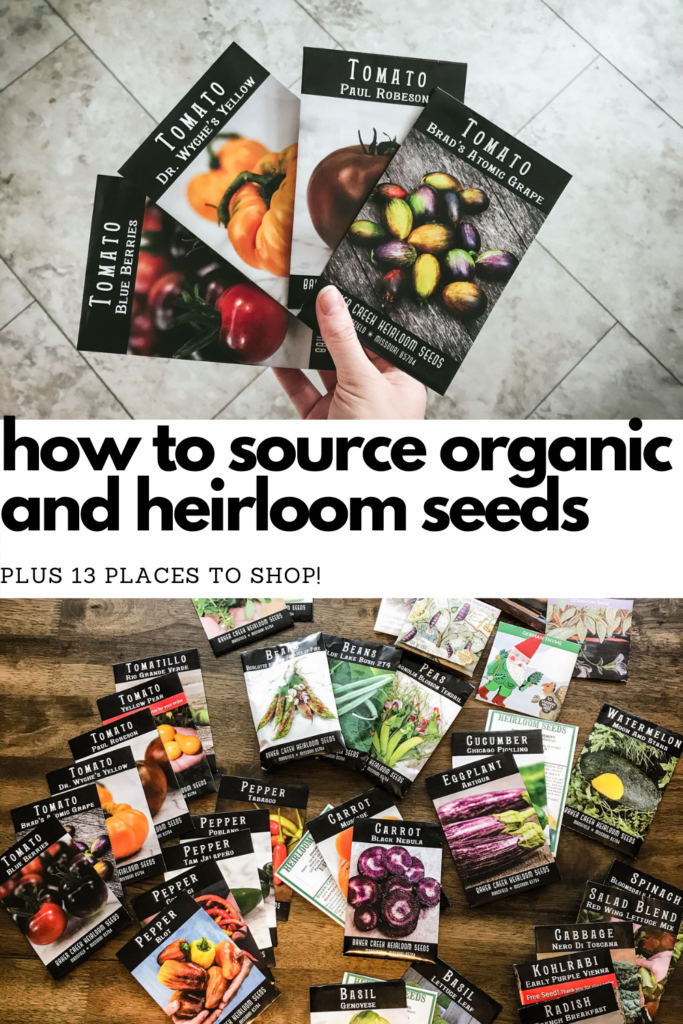


Leave a Reply